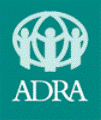Charles Sandefur, president of the Adventist Development and Relief Agency (ADRA) International, returned this week from visiting tsunami-affected areas in Sri Lanka and Thailand.
Traveling down the Sri Lankan coast via helicopter, Sandefur noted, “The devastation is incredible in its breadth. We flew over a hundred miles of coastline. Knowing each village held a tale of suffering magnified the enormity of this disaster.”
Sandefur also visited a camp for internally displaced persons (IDPs) near Ham Ban Tota with Kansas Senator Sam Brownback. “The ADRA supported IDP camp was a place of great contrast. The intense sorrow felt by survivors was contrasted by the compassion shown by donors who made the food ADRA provided to 2,000 people at that camp possible. Water, which tore lives apart, is bringing them together again,” said Sandefur, commenting on an ADRA water pump that not only desalinizes water wells but also provides clean drinking water. “The effectiveness of ADRA’s water teams, providing thousands of liters of clean water every day to thousands of people, has been shown in that there have been no reported outbreaks of cholera or other disease,” he added.
ADRA provided immediate relief to survivors of the tsunami and then rapidly expanded its response. ADRA’s recent work in Sri Lanka includes disinfecting three buildings and a school. Additional equipment, including protective gear, arrived to increase the disinfection process. Approximately 400,000 people will benefit from ADRA’s efforts to decontaminate, disinfect, and deodorize coastal areas in cooperation with the government. Medical aid distribution is ongoing with helicopters aiding in the distribution of supplies. Approval has been provided for distribution of food and non-food items (NFI) like shelter, clothing, or mosquito nets to internally displaced persons (IDPs) in 17 camps.
ADRA’s latest activities in Thailand include reinstalling water systems and rehabilitating wells on the islands of Phrathong and Surin. Residents of these islands were evacuated to the mainland due to limited access to potable water and are being housed in tents while ADRA repairs their water system. ADRA is working with the Phuket Mission Hospital to develop additional interventions for the long-term support of tsunami victims. These interventions will focus predominantly on the physical and psychological needs of those affected by the tsunami. ADRA will also assist with the reconstruction of the Kamala District School.
Sandefur expressed his pride at the tremendous efforts of the ADRA staff responding to the disaster. “ADRA’s staff have been overwhelmed responding to this crisis. Some have lost family members themselves, but continue to work diligently meeting the needs of others. Although those in countries not affected by this crisis may see only a short segment in the news about the tsunami relief efforts, our staff and millions of others are living through this 24 hours a day.”
Sandefur continued, “While so often the diversity of people is emphasized, this tragedy shows that we share a common humanity. Grief is grief. Loss is loss. Pain is pain. There is such a deep sense of loss and pain felt by survivors and their families, it is important for ADRA to respond to those needs and not just the physical needs. This visit has crystallized in my mind that ADRA will respond to this disaster for years to come with long-term rehabilitation and reconstruction.”
ADRA is present in more than 120 countries providing individual and community development and disaster relief without regard to political or religious association, age or ethnicity.
Additional information about ADRA can be found at www.adra.org

